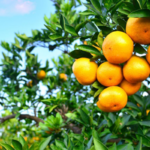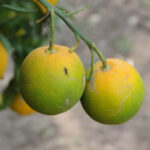FCM a "different ball game" to CBS for South African citrus industry

The South African citrus sector is set to incur substantial costs to fully implement the False Codling Moth (FCM) risk management system being established as a result of new EU regulations, but an industry representative is confident that pest-free consignments can be shipped to the market. 
As of Jan. 1 2018, the FCM (Thaumatotibia leucotreta) will be a regulated pest in the EU for some produce items including citrus, peaches, nectarines and bell peppers from the African continent and Israel.
European authorities said the produce must be "subjected to an effective cold treatment...or another effective treatment" to ensure freedom from FCM, provided that the European Commission (EC) be advised of the system in advance.
Citrus Growers Association (CGA) of Southern Africa special envoy for market access and EU matters, Deon Joubert, believed there was a level of fairness in the reasoning behind the recent ruling which could not be said for regulations concerning the fungal disease citrus black spot (CBS).
He said while science had shown CBS was a leaf-transmitted disease - and so South African citrus imports did not pose a risk to European citrus growers - there was indeed a theoretical risk to the EU with FCM.
"FCM is a different ball game," he told Fresh Fruit Portal.
"It is definitely something that we have in Sub-Saharan Africa. It took quite a while to get across the deserts in Northern and Central Africa, but it arrived in a reasonable form about 12 or 15 years ago.
"Academically at least we have to agree that FCM could pose a risk in Europe, although this would take a damn lot of effort. It's tried to establish, but it's never been successful."
He said the pest has been present in Europe for decades, but as it greatly struggled in cold weather the continent effectively "sterilized itself" every winter.
In addition, he said two moths of opposite sex would have to arrive in the continent at roughly the same stage of their development, in different pieces of fruit, and find a host tree within the very short distance they can travel during their lives.
He also accused European authorities of putting a disproportionate amount of attention on South Africa, which last year had eight FCM interceptions. He said this was a relatively small number compared to other countries.
"We need to have a more consistent inspection and treatment than we've had up to now. But the fairness in the EU issue is that FCM, academically, could pose a threat. We understand that, and the industry needs to comply," Joubert said.
FCM risk from South Africa "very low"
He said the industry was happy to share its FCM risk management system with the EU, just as it had done with CBS, although he noted the system was unlikely to be perfect in its first year of implementation.
"We’ll make some mistakes, but we’ll fix them and we'll become better and better at it. I think that would address the perceived risk about FCM from South Africa," he said.
He said a draft of the management system was currently in the final stages of being signed off by the industry and the Department of Agriculture, Forestry and Fisheries (DAFF), after which it would be presented to the EU.
The systems approach will likely involve a combination of spraying, disrupting insect mating cycles using Sterile Insect Technique (SIT), monitoring orchards and inspecting fruit after it is packed.
"We are quite confident that we can show the ability to send consignments that are free of FCM. We plan to show quite significantly that the risk that we pose in terms of FCM is very low," he said.
Joubert said a preventative maintenance program was far preferable to the using cold treatment, which he explained could be highly detrimental to citrus fruit quality if used with very low temperatures.
"It’s going to be difficult for the growers to comply. It’s going to take a lot of money and time to get settled down and implemented, but we’ve done it before and we're not shying away from the challenge," he said.
"I think we need to embrace it and fix it. It's just going to take a year or two to get it running smoothly."
He noted an FCM management system had been partially implemented in some areas of the Western Cape that ship to the U.S., and that alone had entailed substantial costs.
"I think it's safe to say that a fully implemented system would probably be in the ballpark region that CBS would be, to run this system and ensure compliance," he said.
"Hopefully in time technology becomes better for prevention, or we might even have cultivars resistant to FCM. The research has been going on flat-out, we’ve been preparing for years to deal with different phytosanitary aspects.
"We’ve done one, this is another one, so let’s hope we get this one done and dusted in the next two or three years, and hopefully there’s not another one coming up."
Photo: www.shutterstock.com











































